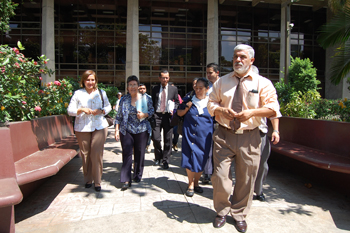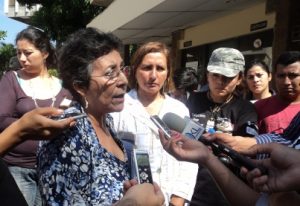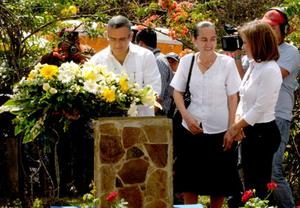Human Rights, Politics
Supreme Court Ruling: Former General Must be Removed as Security Minister
www.Cispes.org
May 17, 2013
Today, the Constitutional Chamber of the Supreme Court ruled that the appointments of David Munguía Payés as Minister of Public Security and Justice, and Francisco Ramón Salinas as Director of the National Civil Police (PNC), violated the Constitution of El Salvador. Payés and Salinas are both former military generals who retired from the Armed Forces before assuming their positions.
The Court’s decision invalidates both officers’ appointments as of today, and mandates that the President immediately name new civilian security officials that guarantee the “organic, functional and subjective separation between national defense and public security.”
Payés and Salinas were named to their posts following enormous US pressure to remove FMLN leaders from the public security cabinet in January 2012. The move was met with widespread public outcry and charges that the US was pushing for the re-militarization of El Salvador. In March of that year, 31 civil society groups filed the constitutional challenge to the two officials’ appointments.
According to the Chamber’s ruling, the appointments violated article 159 of the Constitution, which establishes a separation of national defense and public security functions, and article 168, which mandates that the PNC be led by civilian authorities. Both articles were incorporated into the Constitution as part of the 1992 Peace Accords that ended the nation’s 12-year civil war.
María Silvia Guillén, director of the Foundation for the Study and Application of Law (FESPAD), a legal aid NGO that filed the original suit along with other organizations, expressed satisfaction with the ruling. But she also lamented the impact that major changes to the cabinet would have on the effectiveness of the current security strategy: “Of course, I would say that a whole series of things they have been doing, some of which inspired a lot of hope but sadly were not institutionalized, are going to be left in a very fragile position.”
In El Salvador, issues of violence and security are often used to manipulate public opinion during electoral seasons, and for the past week the country’s main corporate newspapers have been filled with headlines about the failures of the current security strategy. The mainstream media will likely incorporate the latest Supreme Court-mandated changes to the security cabinet into their electoral fodder in benefit of right-wing presidential campaigns, trying to paint a picture of an out-of-control situation of violence and failed security policies.
El Salvador gangs say Supreme Court ruling threatens truce
May 19th, 2013
http://www.bbc.co.uk/news/world-latin-america-22584911
The leaders of El Salvador’s main street gangs have said a decision taken by the Supreme Court threatens a truce that has saved thousands of lives.
The Constitutional Chamber of the Salvadorean Supreme Court declared illegal the appointment of Security Minister David Mungia Payes. He is one of the main architects of the truce, which was agreed in March 2012. Gang leaders gave a news conference in jail criticising the court’s decision.
The Supreme Court also ruled on Friday that the government must replace the country’s police chief, Francisco Salinas. The court says both jobs must be held by civilians. The two men are army generals.
The decision put the lives of Salvadoreans under risk as it threatened the future of the non-aggression pact agreed last year, the gang leaders said. But they renewed their commitment to carry on with the ceasefire, provided it was backed by the security authorities.
President Mauricio Funes says he disagrees with the ruling but will accept it.”I have no doubt that behind the arguments of the court is a very clear anti-military bias,” said Mr. Funes in his weekly radio address. He promised to appoint replacements in the next few days.
LA gang culture
Catholic priests, MS-13 and 18 Street gang leaders celebrate 200 days of truce last year. Leaders representing the Mara Salvatrucha (or MS-13) and 18 Street gangs said they hoped the new security minister and police chief would support the truce.
MS-13 and the 18 Street gangs were created in the 1980s in Los Angeles in the US by poor, mostly illegal, immigrants who had escaped from the civil war in El Salvador. When the conflict ended, with a peace treaty signed in 1992, many of those already in jail in the US were expelled and deported to El Salvador, exporting LA’s gang culture to Central America. El Salvador’s neighbours, Honduras and Nicaragua, also saw an increase in gang violence.
In March 2012 the two gangs agreed to a ceasefire, mediated by the Catholic Church, which has sharply reduced the number of murders in El Salvador. Murder rates have dropped dramatically since the gangs agreed to stop killing each other last year, the government says.
The gangs continue operating in several American cities. Last year, the US Treasury designated MS-13 as a “transnational criminal organisation”.




